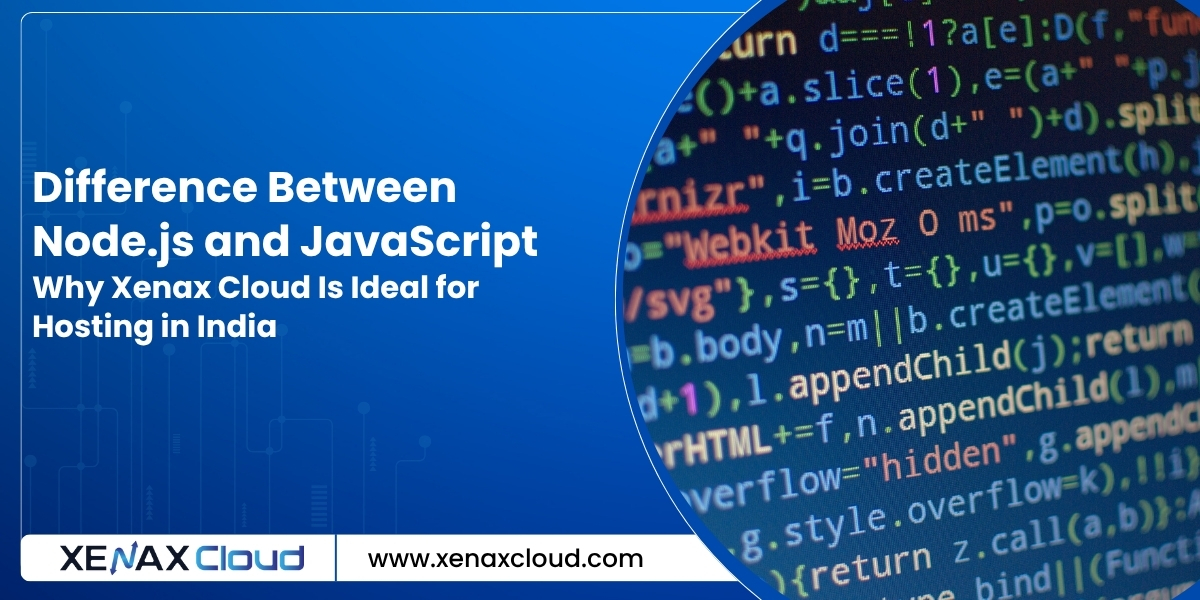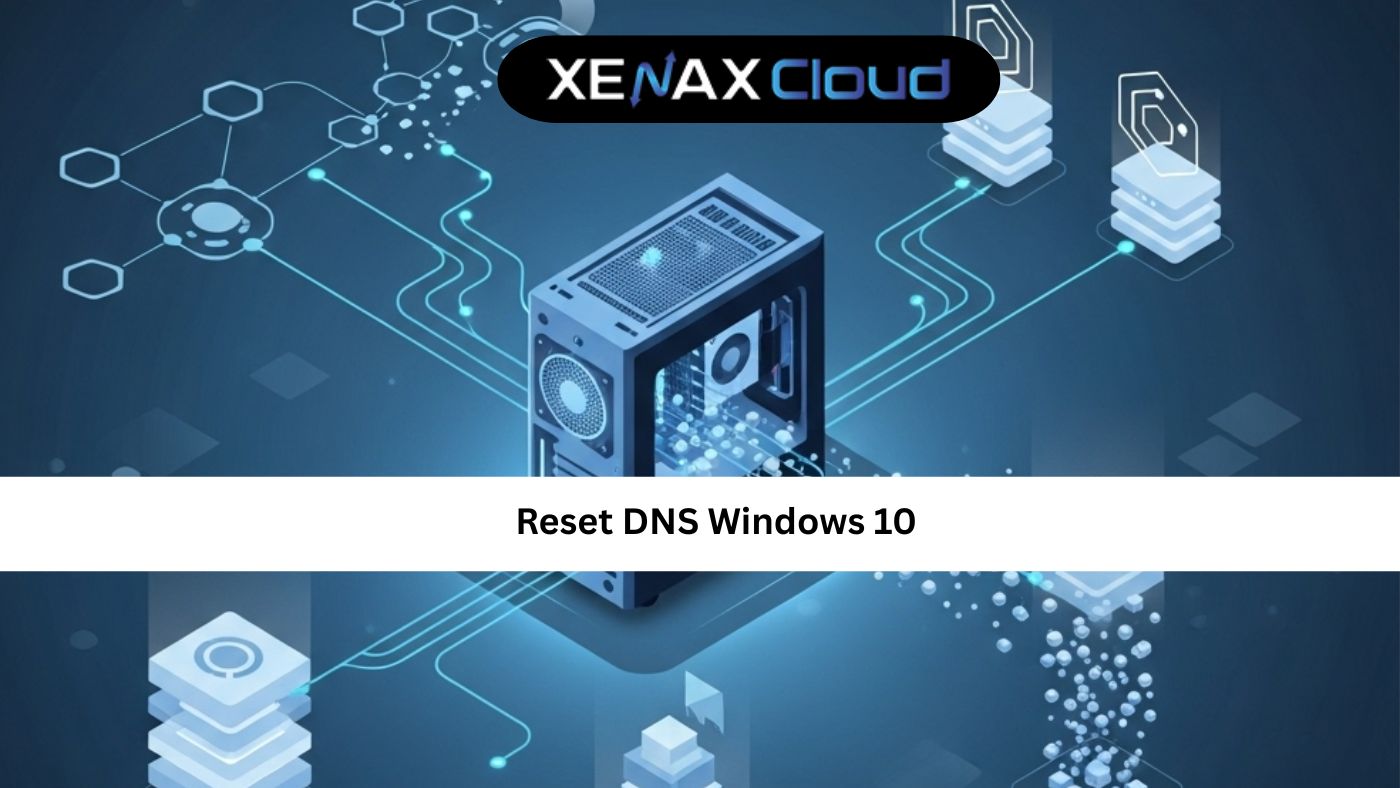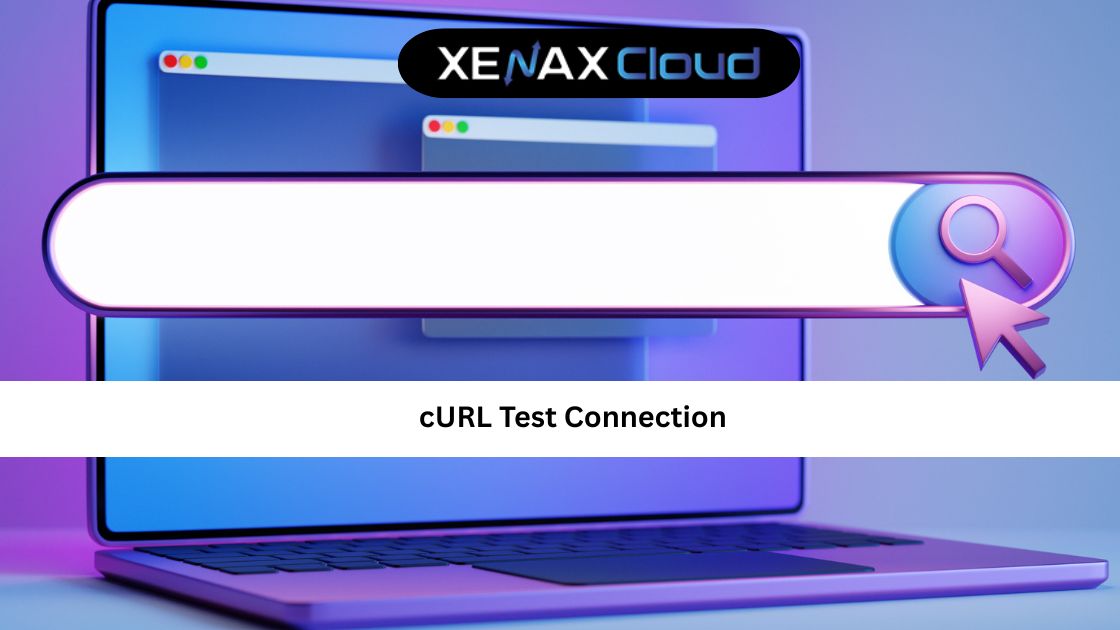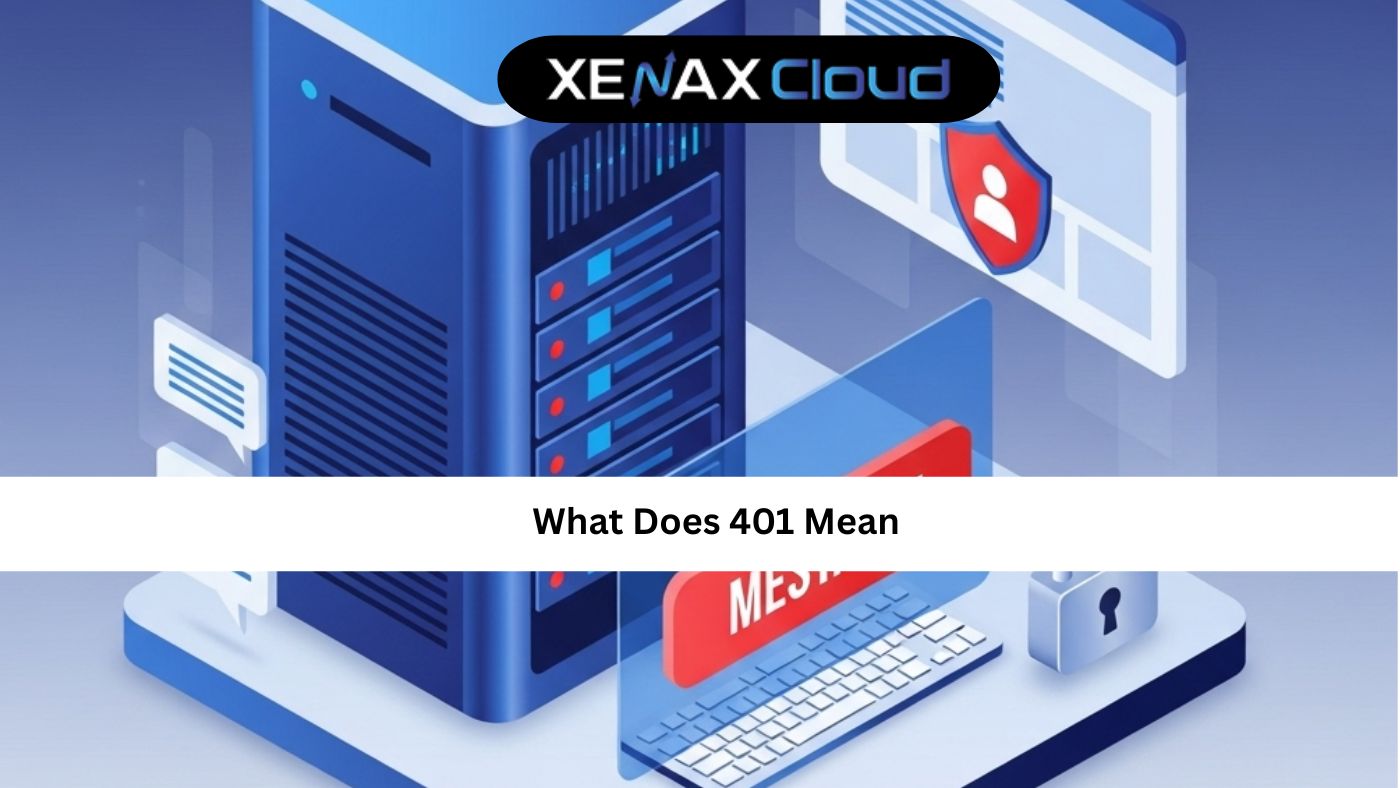For developers, understanding the difference between Node.js and JavaScript is essential to choosing the right hosting environment for web applications. Xenax Cloud, with its state-of-the-art India-based data center, offers a comprehensive suite of hosting solutions—VPS, Dedicated Servers, Shared Hosting, and more—optimized for both JavaScript and Node.js projects. This article explores the differences between Node.js vs. JS, highlights how Xenax Cloud supports these technologies, and explains why their Indian servers are the best choice for developers. From Indian RDP to Reseller Hosting, Xenax Cloud provides the tools to succeed.
Understanding the Difference Between Node.js and JavaScript
While often confused, JavaScript and Node.js serve distinct purposes:
- JavaScript: A client-side scripting language executed in browsers to create dynamic, interactive web content (e.g., animations, form validation). It’s ideal for front-end development.
- Node.js: A server-side runtime environment that extends JavaScript to build scalable, real-time applications (e.g., APIs, chat apps). It uses the V8 engine for high performance.
When comparing the difference between JS and Node.js, JavaScript runs in browsers, while Node.js enables server-side scripting, requiring specialized hosting. Xenax Cloud’s India-based hosting ensures low-latency, secure environments for both, with compliance to local data regulations.
Why Hosting Matters for Node.js vs. JS
JavaScript-based websites can run on standard hosting like Shared Hosting, but Node.js applications demand servers capable of handling its runtime, such as VPS or Dedicated Servers. Poor hosting can lead to slow performance, downtime, or compatibility issues. Xenax Cloud’s India-based data center offers low-latency access, robust security, and 24/7 support, making it ideal for hosting both JavaScript-driven sites and Node.js applications.
How to Host Node.js and JavaScript with Xenax Cloud
Here’s how to deploy Node.js and JavaScript projects using Xenax Cloud’s hosting solutions:
- Choose a Hosting Plan: Select Shared Hosting for JavaScript sites or VPS for Node.js applications.
- Set Up Node.js:
- Access your VPS via SSH or Indian RDP.
- Install Node.js:
sudo apt install nodejs npm. - Upload your Node.js app and run
npm installto install dependencies.
- Host JavaScript Sites: Use Shared Hosting with cPanel to upload JavaScript files and configure your site.
- Secure Your Domain: Register a domain via Domain for a professional identity.
- Test and Deploy: Verify performance using Xenax Cloud’s low-latency Indian servers.
Xenax Cloud’s hosting ensures seamless deployment for both technologies.
Xenax Cloud’s Hosting Solutions for Node.js and JavaScript
Xenax Cloud offers a range of hosting solutions optimized for the difference between Node.js and JavaScript.
1. Shared Hosting: Affordable JavaScript Hosting
Shared Hosting is ideal for JavaScript-based websites or small projects. Features include:
- 99.5% uptime: Ensures reliable access for users.
- Free SSL certificates: Secures client-side JavaScript applications.
- cPanel access: Simplifies website management.
This is perfect for static or dynamic JavaScript websites.
2. VPS: Scalable Node.js Hosting
Xenax Cloud’s VPS supports Node.js applications with dedicated resources. Benefits include:
- Customizable resources: Scale CPU, RAM, and storage for Node.js apps.
- Root access: Full control to install Node.js and configure environments.
- India-based servers: Low latency for Indian users.
VPS is ideal for real-time Node.js applications like APIs or chat systems.
3. Indian RDP: Secure Remote Management
Xenax Cloud’s Indian RDP provides secure remote access for managing Node.js or JavaScript projects. Features include:
- Seamless connectivity: Access servers from anywhere in India.
- Robust security: Protects code and data.
- Affordable plans: Cost-effective for developers.
This is perfect for remote Node.js deployment and management.
4. Dedicated Servers: High-Performance Hosting
For large-scale Node.js applications, Xenax Cloud’s Dedicated Servers offer exclusive resources. Benefits include:
- Full resource allocation: Optimal performance for demanding Node.js apps.
- Custom configurations: Tailor server settings for Node.js vs. JS needs.
- Indian data center: Fast access for local users.
This is ideal for enterprises with high-traffic applications.
5. Domain Registration: Brand Your Projects
A strong domain name enhances your project’s identity. Xenax Cloud’s Domain registration services offer:
- Competitive pricing: Affordable .com, .in, and other extensions.
- Easy DNS management: Streamlined setup for Node.js and JavaScript sites.
- Local appeal: .in domains for Indian audiences.
A professional domain boosts credibility and SEO.
6. Reseller Hosting: Offer Hosting Services
Xenax Cloud’s Reseller Hosting allows you to provide Node.js and JavaScript hosting under your brand. Features include:
- White-label branding: Build a professional hosting business.
- Scalable resources: Support multiple clients’ projects.
- 24/7 support: Xenax Cloud handles technical issues.
This is ideal for agencies serving developers.
Benefits of India-Based Hosting for Node.js and JavaScript
Xenax Cloud’s India-based data center offers:
- Low Latency: Faster load times for Indian users, enhancing UX and SEO.
- Data Compliance: Adherence to India’s data protection laws.
- Localized Support: 24/7 assistance in multiple Indian languages.
- Scalability: Solutions for both small JavaScript sites and large Node.js applications.
These advantages make Xenax Cloud a top choice for hosting Node.js vs. JS projects.
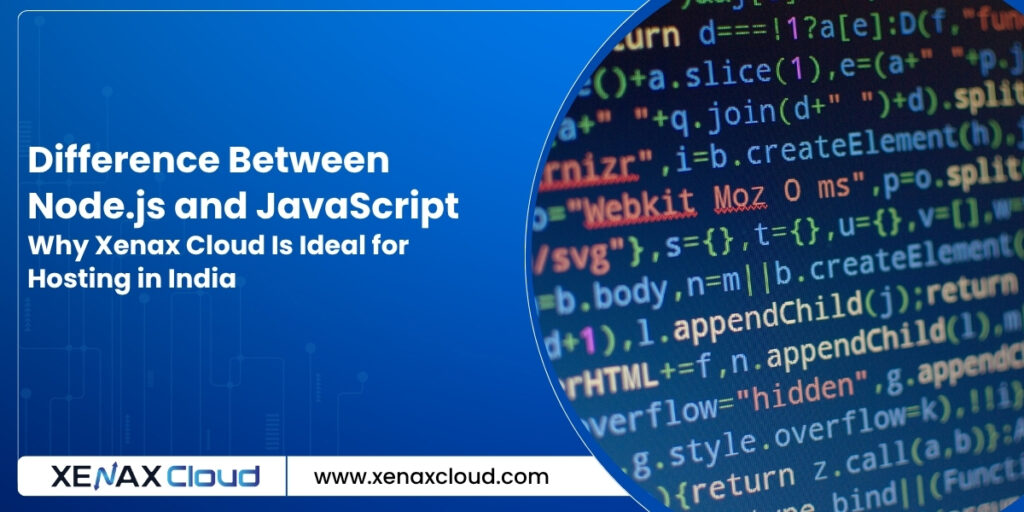
FAQs
1. What is the difference between Node.js and JavaScript?
JavaScript is a client-side scripting language, while Node.js enables server-side JavaScript. Xenax Cloud supports both with VPS and Shared Hosting.
2. How does Node.js vs. JS impact hosting choices?
JavaScript suits Shared Hosting for client-side apps, while Node.js requires VPS or Dedicated Servers for server-side apps.
3. Does Xenax Cloud support Node.js hosting?
Yes, Xenax Cloud’s VPS and Dedicated Servers are optimized for Node.js applications.
4. Are Xenax Cloud’s hosting solutions secure for Node.js and JavaScript?
Yes, all plans include free SSL certificates, firewalls, and backups to protect your projects.
5. Can I host multiple Node.js or JavaScript projects with Xenax Cloud?
Yes, VPS or Reseller Hosting supports multiple projects with scalable resources.
Conclusion
Understanding the difference between Node.js and JavaScript is key to selecting the right hosting solution. Xenax Cloud offers unmatched hosting—Shared Hosting, VPS, Indian RDP, Dedicated Servers, Domain, and Reseller Hosting—tailored for Indian developers. With India-based servers, Xenax Cloud ensures low latency, security, and compliance for Node.js vs. JS projects. Explore their services today to power your applications with confidence.

